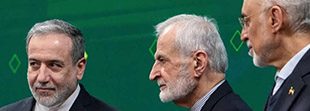As commander of the Revolutionary Guards Air Force during the 1999 student protests, Ghalibaf was one of the 24 IRGC commanders who sent a threatening letter to the reformist president Mohammad Khatami stating that if the protests were allowed to continue, they would take matters into their own hands.
He has skillfully used media and visual branding, often appearing in business suits rather than clerical attire, and projecting a corporate, managerial image uncommon among top officials. Despite this, the luxury-shopping scandal involving his family in 2022 weakened his credibility among conservatives and sparked public criticism over hypocrisy and privilege. Ghalibaf represents a new archetype in the right: the technocratic revolutionary. He blends revolutionary loyalty with an appeal to modern governance — advocating for stability, urban renewal, and technological advancement under the banner of Islamic values.

